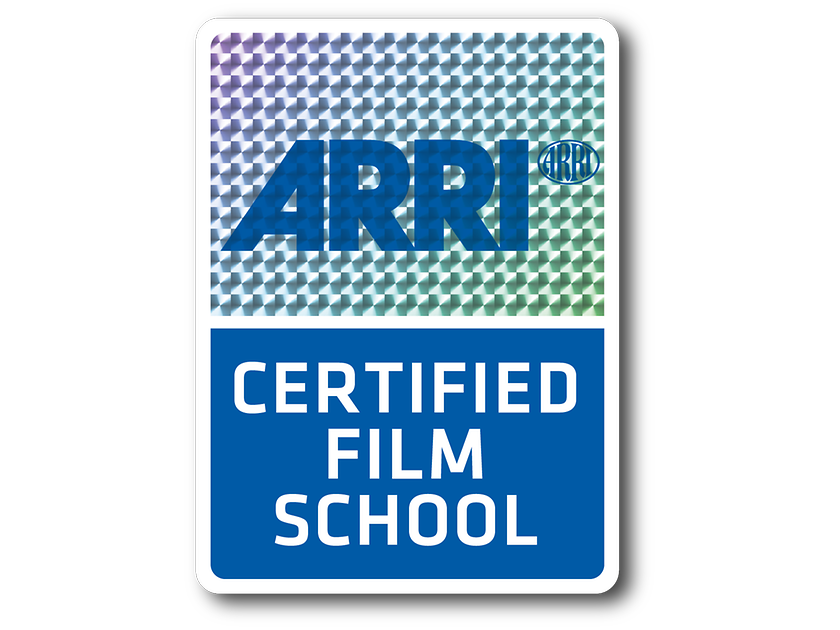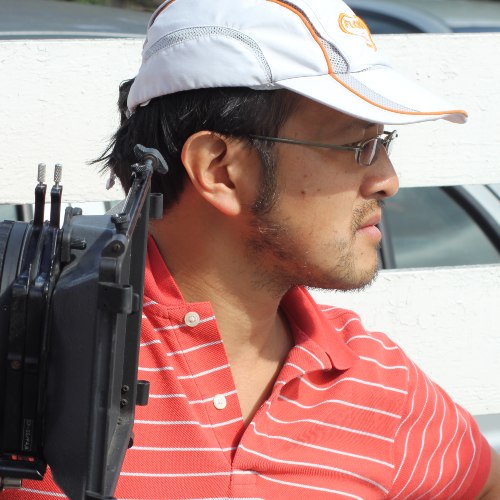Film and Television Production, BA Hons
This Film and Television Production Degree will equip you with the varied skillset, experience and portfolio required to enter, work and succeed in today’s Film and TV industries.
This is a practice-based course that aims to train the complete, versatile, contemporary film-maker, with a strong academic and theoretical underpinning.
Our students are well served by high-end professional film cameras, a Film Studio, a multi-camera TV Studio as well as a new, state-of-the art Virtual Production facility. All our modules are taught by practitioner/lecturers, all of whom have a wealth of many years’ professional experience in the Film & TV industries.
The course will cover the whole Production process, from Scriptwriting, Producing and Directing, through to Camera, Sound and Editing. TV, Fiction Film and Documentary genres are covered in depth. You will graduate with a full portfolio, and skilled to enter any one of the very many Film and TV industries.
UCAS points
112 (full requirements below)
Course/institution codes
P331 G BA/FTVP
Interested in a different year?
Select your preferred
to view up to date information.
School
Location
Duration
- 3 years full-time
- 6 years part-time
- 4 years sandwich
Start month
September
Home* /international fees 2025/26
£9,535 /£17,500
What you should know about this course
* The Department for Education has indicated that it intends to raise the Home tuition fee limit from £9,250 to £9,535 for 2025/26.
What you will study
About the course team
You will be taught by renowned experts working in a variety of film and TV-related fields. Our staff has screened at festivals around the world, and won awards for scripts and short film and prizes.
Our research and consultancy work inform academics, and over 90 per cent of the lecturers that teach on our Film and Television Production course hold a teaching qualification.
Come and meet us
We are offering virtual events so that you can still experience how Greenwich could be the right university for you.
Next Open Days
Got a question?
To find out more about our Open Days and Campus Tours or if you need any assistance, please email opendays@gre.ac.uk.
Entry requirements
Qualifications
- 112 UCAS Tariff points. We accept A Levels, T Levels, BTECs, Access to HE and all other qualifications with UCAS Tariff points.
Contextual Admissions
- We make Contextual offers to this programme. Applicants that meet specific eligibility criteria will be made a contextual offer with a reduced tariff of up to 16 UCAS Tariff points. Other entry requirements such as GCSEs, Interview, etc., will still need to be met. For further information, please see our Contextual Admissions Policy.
For more information, use our contact form or call us on 020 8331 9000.
You can also read our admissions policy.
For more information, use our contact form or call us on 020 8331 9000.
You can also read our admissions policy.
Available to overseas students?
Yes
Can I use Prior Learning?
For entry: applicants with professional qualifications and/or four years of full-time work experience will be considered on an individual basis.
For exemption: If you hold qualifications or courses from another higher education institution, these may exempt you from courses of this degree.
How you will learn
Teaching
Learning takes place through a combination of timetabled learning and independent study.
You can view more information about how each module is taught within our 'What you will study' section.
Seminars and workshops enable you to discuss and develop your understanding of topics covered in lectures in smaller groups. You will also be able to meet your personal tutor. Timetabled learning may fall between 9am and 9pm depending on your courses and tutorials.
Class sizes
The typical student intake per year averages 75-80. Lectures are normally attended by larger groups, and seminars or tutorials by smaller groups. Numbers can vary more widely for modules that are shared between degrees.
Independent learning
Outside of timetabled sessions, you are also expected to dedicate time to independent study (around 8-10 hours per module per week).
Every module will involve further reading and research. You may also be expected to spend time preparing for classwork such as presentations and group discussions, and for assessed coursework and examinations.
You can use our Stockwell Street Library and online resources to support you in these activities.
We encourage you to join student societies such as:
You can also participate in our film festivals:
Overall workload
If you are studying full-time, you should expect the workload to be similar to a full-time job (approx. 40 hours per week in total). For part-time students, this will reduce in proportion with the number of courses you are studying.
Each module you study towards this degree is worth 30 credits. These represent around 300 study hours respectively. If you receive 72 contact hours for a 30-credit module, you should expect to commit 228 hours to independent study to complete it successfully.
Assessment
You can view how each module is assessed within our 'What you will study' section.
Each course has formal assessments which count towards your grade. Some courses may also include 'practice' assignments, which help you monitor progress and do not count towards your final grade.
Feedback summary
We aim to give feedback on assignments within 15 working days.
Dates and timetables
The academic year runs from September to June.
Full teaching timetables are not usually available until term has started. For any queries, please use our contact form.
Official statistics on Discover Uni
Full time
Part time
Fees and funding
Tuition fees
| Cohort | Full time | Part time | Distance learning |
|---|---|---|---|
| Home* | £9,535 | £2,384 per 30 credits | N/A |
| International | £17,500 | £4,375 per 30 credits | N/A |
University is a great investment in your future. English-domiciled graduate annual salaries were £10,500 more than non-graduates in 2023 - and the UK Government projects that 88% of new jobs by 2035 will be at graduate level.
(Source: DfE Graduate labour market statistics: 2023/DfE Labour market and skills projections: 2020 to 2035).
* The Department for Education has indicated that it intends to raise the Home tuition fee limit from £9,250 to £9,535 for 2025/26.
Other costs
Trips: Any compulsory field trips are funded by the school.
Resources: For Architecture, Landscape and Design courses, you will produce portfolios of large format plots plus CNC/3D printed models etc. Costs will vary but could reach £250 a year for printing, £100 for model making, and £50 for visiting the sites.
Software: We provide Adobe software and Lynda.com online video tutorials. You will also have access to Nvivo, SPSS Modeler and SPSS Amos. Any licenses for software outside of our range will come at your own cost.
Scholarships and bursaries
We offer a wide range of financial help including scholarships and bursaries.
The Greenwich Bursary
This bursary is worth £700 for new undergraduate students with a low household income, entering Year 0 or 1 who meet the eligibility criteria.
EU Bursary
Following the UK's departure from the European Union, we are supporting new EU students by offering a substantial fee-reduction for studying.
Financial support
We want your time at university to be enjoyable, rewarding, and free of unnecessary stress, so planning your finances before you come to university can help to reduce financial concerns. We can offer advice on living costs and budgeting, as well as on awards, allowances and loans.
Careers and placements
Will I have a work placement?
This course can be taken in sandwich mode, which means you can take a year to work in industry between your second and final years of study. Sandwich placements are relevant to your degree subject and are paid roles. It is the very best way of preparing you for successfully finding a job quickly when you graduate.
How long is my placement?
Sandwich placements last for between 9-13 months. Work-based learning module placements are normally one day a week for either one or two terms depending on the number of credits available from the module.
What are the financial arrangements?
Sandwich placements are paid roles whereas work-based learning module placements are normally unpaid.
What sort of careers do graduates pursue?
Career options are wide-ranging. They include studio and location camera work, editing/post-production, screenwriting, producing, TV and commercial work, and multimedia design and production.
Are internships available?
Students are encouraged to take up Summer internships during the Summer holidays, though it is up to the student to find them. Support is available to students from the Employability and Careers Service when applying for placements and internships.
Do you provide employability services?
Employability activities take place all the time at Greenwich and students are encouraged to take part in as many opportunities as possible. The central Employability and Careers Service provides support for students preparing to apply for placements and graduate roles, such as CV clinics, mock interviews and employability skills workshops. In addition, your School has a dedicated Employability Officer who will be organising work-related activities throughout the year which will help you to build you industry knowledge and networks.
Accommodation
Greenwich
Living in halls of residence is a great way to make new friends and get into the social side of university life. With four great locations, all minutes away from the campus and the centre of historic Greenwich , you will be at the heart of one of the most beautiful university settings in the UK.
Rooms start at £146.30/wk and include Wi-Fi, utility bills, access to our on-campus gym and 24-hour security - and just a 10-minute train journey to central London. Students based at our Greenwich campus can also choose to live the Student Village at Avery Hill, which is only a short ride on our free shuttle bus.
Support and advice
Academic skills and study support
We want you to make the most of your time with us. You can access study skills support through your tutor, our subject librarians, and our online academic skills centre.
Where appropriate, we provide support in academic English and mathematics. If you need to use particular IT packages for a specific module, we provide training for this.
Do you provide employability services?
Employability activities take place all the time at Greenwich and students are encouraged to take part in as many opportunities as possible. The central Employability and Careers Service provides support for students preparing to apply for placements and graduate roles, such as CV clinics, mock interviews and employability skills workshops. In addition, your School has a dedicated Employability Officer who will be organising work-related activities throughout the year which will help you to build you industry knowledge and networks.
Not quite what you were looking for?
We've got plenty of other courses for you to choose from. Browse our undergraduate courses or check our related courses below.....
Film, media and sound at the University of Greenwich
Develop your skills and knowledge, shape your creative future, in great facilities appropriate to your course - purpose-built film, TV and sound studios, edit suites, and more!
Visit our film, media and sound degrees page.
Michael Kelpie: Producer of ITV's The Chase
Our Media and Communications graduate has forged a hugely successful career at UK production companies and broadcasters. His achievements include a BAFTA for ITV game show, The Chase.
Film, media and sound degrees
Mode of study
Select from the dropdown below.
| Course level | |
| UCAS code | |
| Duration | |
| Location |










